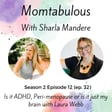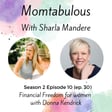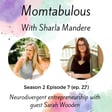Become a Creator today!Start creating today - Share your story with the world!
Start for free
00:00:00
00:00:01

How to help your teen Give a Sh*t
It's back to school time! And I'm back with a spicy episide!
If you have a Neurospicy teen, (or just a teen in general), or are neurospicy yourself, listen to this episode with Becca Block, co-author of "Can you help me give a Sh*t" - Unlocking teen motivation in school and in life.
Listen in as she gives us the ABCD's of motivation and clear action steps to take so you don't have to do the school battles this year.
For more about Becca, find her here - beccablock.com
Transcript
Introduction to Momtabulous and Dr. Becca Block
00:00:01
Sharla Mandere
Hello and welcome back to Momtabulous. I'm your host, Sharla Mandere, and with me today is Becca Block, PhD. She is a researcher, educator, and coach who works with NeuroSpicy, I like that word, NeuroSpicy adults and teens.
00:00:18
Sharla Mandere
She recently released the book, Can You Help Me Give a Shhh?
00:00:24
Sharla Mandere
which I love, unlocking teen motivation in school and life, along with co-author Grace Edwards. She's a fan of helping anyone who wants to learn ways that fit their unique brain to achieve their goals and build lasting motivation.
00:00:40
Sharla Mandere
And you can find more about her at beccablok.com.
Origin of 'Can You Help Me Give a Shhh?'
00:00:43
Sharla Mandere
Welcome, Becca. I'm so excited you're here. her
00:00:45
Becca Block, PhD
I'm so glad to be here, Sharla. Thanks so much for having me on.
00:00:47
Sharla Mandere
I love this. So neuro spicy. I love that because it it is like, I feel like neurodivergence gets this like negative tone or we just say so much neurodivergent, neurodivergent, neuro spicy.
00:00:56
Becca Block, PhD
Yeah.
00:01:00
Sharla Mandere
I like, cause I feel like I am definitely neuro spicy. and bi We add the word spice. It describes teens, but we're talking about motivation with teens and adults and how they're kind of the same and kind of different, but go ahead and like share a little more of your journey, your story of how you got here.
00:01:19
Becca Block, PhD
Yeah, so the, ah i'll I'll just stick with the story for the book for now, because my overall story of how you get here at the age that we are at is always a long one, right? So um with the book in particular, several years ago, a colleague of mine was teaching a course for high school students, and she'd ask them, tell me what you want to get out of this course, and mean they could all sort of fill it out on a piece of paper.
00:01:40
Becca Block, PhD
And one of them wrote, can you help me give a, except they wrote the foreword, about high school, I want to, but I just don't know how.
Research Journey and Youth Voice in Motivation
00:01:47
Becca Block, PhD
And she came to me and another colleague to talk with us and get strategies from us because she knew that we knew a lot of education research. And she was like, what do I do to help? um And I, like any good nerd, wanted to find her a good book.
00:02:01
Becca Block, PhD
And I couldn't find one. So since my book came out, like this is, I guess I hit a hot topic. I don't know. I didn't realize it. Several other books have come out on the topic in the last year. But at the time, there wasn't anything that was really kind of walking through, especially from a really practical perspective, like how do we integrate the research to be useful to parents and educators?
00:02:22
Becca Block, PhD
So I went and and interviewed young people over the country. My co-author, Grace, is a young person herself who was actually one of the first people I interviewed and had a background in journalism. And I was like, I really want to incorporate youth voice more thoroughly.
00:02:35
Becca Block, PhD
So actually she became my co-author. um And basically we were looking to talk with high school and college students all over the country about like really what made the biggest difference in your most and least engaging learning experiences um and kind of pull those stories together with all the existing nerdy research i already knew, um but really kind of put it from their perspective and sort it out into kind of themes that would be useful for parents and educators who are looking at their teens going,
00:03:03
Becca Block, PhD
Ah, like you're so, you know, there's kind of two options. know, like they're either super apathetic, or they're super overachieving, stressed out, like perfectionistic, right. And those, in my experience, are actually two sides of the same coin, with the same core motivation issues actually at the center of them.
Understanding 'NeuroSpicy' Identity
00:03:21
Becca Block, PhD
So that's kind of a story behind the book.
00:03:21
Sharla Mandere
Thank
00:03:23
Becca Block, PhD
um And I work with NeurosPicy folks because I'm NeurosPicy. My whole family is NeurosPicy in a variety of different ways. We have just all the spices. And I like using that term because it is a bit more affirming, right? It's not just the kind of medicalized, like you feel trapped by a sentence.
00:03:37
Becca Block, PhD
um And that was one of the things that I found in interviewing students and in the work that I've done with people for decades is that for those of us whose brains work a bit differently, whether it's due to a specific diagnosis or due to the changing, fluctuating hormones of perimenopause, for instance, right? Like we get told a lot that here's the strategy you're supposed to use.
00:03:57
Becca Block, PhD
And by the way, if you can't make that strategy work for you, you're failing. um And that's just not true, right? And so that's how those two things kind of come together, if that makes any sense. It's kind of a long intro.
00:04:08
Sharla Mandere
No, I love it. And you know, and I love that you said the two sides of the same coin of the kids that are having a really hard time and they're struggling and the kids that seem to be quote unquote thriving, right? Because we I think it's easy as a mom to fall into that comparison and be like, my kid is here and struggle.
00:04:30
Sharla Mandere
And then there's this kid over here who has a 4.8 GPA in their sports and they're and they
00:04:34
Becca Block, PhD
Yeah.
00:04:37
Sharla Mandere
theyre they they they you know they they look great and it looks like everything is fine, but maybe...
00:04:40
Becca Block, PhD
Yeah.
00:04:42
Sharla Mandere
So i can you speak to that a little bit and explain? Because like I know I live in that world sometimes with my daughter that we've and i've talked about on the podcast.
00:04:45
Becca Block, PhD
yeah
00:04:50
Sharla Mandere
We've had to pull in homeschool and um you know we're struggling to get to classes and we're we're working with her really hard and we're in all the therapies.
Challenges in Teen Motivation
00:05:00
Sharla Mandere
And it's it's very easy to look at some other, she's in seventh grade right now, but other you know seventh and eighth grade kids and be like, you know you were in the pandemic at the same time as my kid.
00:05:10
Becca Block, PhD
Yeah.
00:05:10
Sharla Mandere
So why do you quote unquote, get to go to school and feel good and thrive and continue to do all the things. And my kid is, is, is still in this like pandemic struggle and, and it's very easy to compare.
00:05:26
Sharla Mandere
And I've had to really catch myself and do a lot of work around myself to not do that because maybe it's what it, right. It's like the social media, you know,
00:05:36
Becca Block, PhD
here
00:05:37
Sharla Mandere
real, right? Of like, everything looks fine on the outside, but then, oh, life might be very different.
00:05:38
Becca Block, PhD
Yeah.
00:05:43
Sharla Mandere
So can you speak to that?
00:05:45
Becca Block, PhD
Yeah, there's there's so many different elements of that. So just like time me out if I start going down a rabbit hole.
00:05:48
Sharla Mandere
so
00:05:50
Becca Block, PhD
i So one piece of it is that when you're looking at motivation, one of the biggest things that interfere with anyone's motivation, but it gets very heightened during the adolescent time period, is that we really need to feel like we have meaningful choices. So I'll talk at some point about the ABCDs of motivation.
00:06:08
Becca Block, PhD
The C part is for choices. We need to feel like we have meaningful choices. When so much of what you are being told to do is scripted for you, right? You have to go to school. You have to take these certain classes. You have like, have to, have to, have to, have to, have to, right?
00:06:22
Becca Block, PhD
um Then that part really gets kind of shut down.
00:06:26
Sharla Mandere
Peace.
00:06:27
Becca Block, PhD
There's two ways that I commonly see teens respond to that. One is they become very apathetic. And the other is they go, okay, well, if I can't have choices in the main stuff, I'm going to create all the choices with all of the other things that I'm going to add. I'm going to add all these extracurriculars. I'm going to add these sports. I'm going to add these honors or AP classes. I'm going to add, add, out add, add.
00:06:45
Becca Block, PhD
That usually tends to be paired with um obviously a lot of like performance pressure, right? So it does not help that currently in culture, the story is you got to go to one of the top 25 colleges and universities or else you're just going to bomb out at life.
00:06:57
Becca Block, PhD
It's not true. If you want the evidence of that, go read the book Never Enough by Jennifer Burhani Wallace. I'm not promoting myself here with this one. It's just a really good book. I get no affiliate sales. Just a really good book that explores why it's so destructive.
00:07:06
Sharla Mandere
Thank you.
00:07:10
Becca Block, PhD
This like high achievement, toxic performance culture is so destructive. um And so the flip side of both of those coins, either I flatline out or I'm just like going bonkers all the time.
00:07:22
Becca Block, PhD
You walk down the line and you have students who after college are burning out and much more likely to use a bunch of substances in the case of the high achieving ones because they've burned the candle at like three ends so all throughout high school, all throughout college.
00:07:40
Becca Block, PhD
And now they're supposed to hit their careers and be all full of energy. And instead they're wiped They've got nothing left in the in the tank, right? um So you you this is a whole phenomenon that's been studied and talked about, right? We're not doing them any favors.
00:07:54
Becca Block, PhD
On the flip side, the ones that are... that are disengaged, the narrative they've now built about themselves is I'm lazy, I'm a loser, I have no drive, I can't do anything, right, because of the ah response to the structure around That's the thing that they internalize about themselves. And so they also are struggling, right? And so to me, I look at it and I go, oh, if we would just...
00:08:18
Becca Block, PhD
set things up a little bit differently. We would not have the kind of structures that route so many, some people make it through unscathed, but they route so many people into these two different really destructive pathways.
00:08:30
Sharla Mandere
Yeah. I mean, I've said that for years, right? Of like, we are putting so much pressure on children right now and they're not getting a childhood.
00:08:38
Becca Block, PhD
Yes.
00:08:38
Sharla Mandere
So yeah, I see that in this kid that like, so and look, I was, I think the one kid that was like, I want to, I'll just do everything because, because have, you know, ADHD and...
00:08:51
Sharla Mandere
People hear me talk about jobs I've had they're like, you have lived like 27 lives. And I'm like, yeah, I get bored really, really easily.
00:08:55
Becca Block, PhD
Save.
00:08:57
Sharla Mandere
And I love to learn new things.
00:08:58
Becca Block, PhD
Yep.
00:09:00
Becca Block, PhD
Yep.
00:09:01
Sharla Mandere
So I'm like, once I feel like I know enough, I'm like bored. And then I'm like, oh, oh, squirrel, let me learn this thing.
00:09:07
Becca Block, PhD
Shiny new thing to learn. Exactly. Yep. Can totally relate.
00:09:10
Sharla Mandere
dry i mean, I was a whitewater river guide, a professional rock climber, I'm a my health and wellness coach.
00:09:11
Becca Block, PhD
Yep.
00:09:15
Sharla Mandere
I was a gymnastics coach. I worked at a shoe store. Like, I, I can tell you everything about running shoes you want to know.
00:09:20
Becca Block, PhD
Yep.
00:09:22
Sharla Mandere
Like, you know, it's like i so many, but it was all physical jobs because I can't, I don't sit well behind a desk.
00:09:24
Becca Block, PhD
Yep.
00:09:27
Becca Block, PhD
Yeah, yeah.
00:09:30
Sharla Mandere
Right.
00:09:31
Becca Block, PhD
Yeah.
00:09:31
Sharla Mandere
um And I think that was where school was really hard for me was sitting still all day long.
00:09:37
Becca Block, PhD
Yeah.
00:09:38
Sharla Mandere
I remember my history teacher freshman year screaming at me because my legs were like swinging under my desk. because it was the period right before lunch. I'd sat all day. I was hungry.
00:09:47
Becca Block, PhD
Yeah. yeah
00:09:48
Sharla Mandere
my i was not interested in history at that point. And I didn't relate to him. And I just was antsy. And my legs would swing under my desk.
00:09:55
Becca Block, PhD
yeah
00:09:57
Sharla Mandere
And he would he sent me to the principal's office. The principal was like, well, did you kick somebody? No. did
Exploring the ABCDs of Motivation
00:10:03
Sharla Mandere
Were you making a set? No. i was good Were you doing? No. where yout No, he just he didn't like that my legs were swinging under the desk.
00:10:09
Sharla Mandere
She would go back to class. but You know?
00:10:12
Becca Block, PhD
Thank goodness the principal at least saw the total ludicrousness of like, you're like, I need a coping strategy. Thanks. This is before the era of accommodations. Like I just, yeah.
00:10:20
Sharla Mandere
Yeah. I mean, she basically just rolled. I mean, she knew this guy, he was like in his seventies. He should have retired. He was just old and cranky. And, you know, she was just like, go back to just try not to distract him.
00:10:34
Sharla Mandere
i think she was like, ah
00:10:38
Sharla Mandere
But like, you know, i i i i have a hard time sitting still. So everything I did was very physical, you know?
00:10:44
Becca Block, PhD
Yeah.
00:10:44
Sharla Mandere
But like, I do think that's an um important point, right? Of like, the there's there are, it seemed to be like boxes that the kids fit into. and And then, but even within those boxes, there's little sub boxes, like everyone's different, you know?
00:10:58
Becca Block, PhD
yeah
00:10:59
Sharla Mandere
um So how do we get teenagers motivated? Because- I think this is the, right? Like, and think as a mom, a saying that I had heard a long time, right? It's like, you're only as okay as your least okay child.
00:11:13
Becca Block, PhD
Mm-hmm.
00:11:13
Sharla Mandere
So if a mom is like, stressed out and struggling, it's usually because we're worried about our kids in some way or another. So, and one of those ways is like, my kids used to want to go out of the house.
00:11:27
Sharla Mandere
They used to want to do things like go to the park and the zoo and the the fun things. And now, God forbid, they wake up before noon and, you know, get out the door and Getting to school in the mornings is probably for some people as much of a struggle as it was in kindergarten when they were learning how to go to school.
00:11:42
Becca Block, PhD
Yeah.
00:11:43
Sharla Mandere
Right. So how do we get teenagers motivated to like, say, clean their room or, you know, do their homework time or even turn in the assignments that they finished, but just haven't turned Turn in.
00:11:47
Becca Block, PhD
Yeah. Yeah. yeah yeah
00:11:55
Sharla Mandere
know
00:11:58
Becca Block, PhD
That last piece is often not a motivation thing, but another piece of executive functioning, but I'm happy to get into that as well. Let me answer your motivation question first, right? So my orientation towards all of this is we can motivate people directly.
00:12:13
Becca Block, PhD
but that usually backfires, right? So like the ways to like most directly motivate people are with extrinsic motivators, right? Carrot stick. And you just have to keep what you would notice as a parent, what I've certainly noticed a parent. Every time I use the carrot or stick, it's gotta be a bigger carrot and a bigger stick the next time and a bigger carrot and a bigger stick the next time. And at a certain point, especially with our teens, it just becomes there is no carrot or stick big enough that I'm willing to offer, right?
00:12:36
Becca Block, PhD
I'm not going to offer them a thousand dollars and I'm not going to ground them for an entire year, right? And so like, You tap out, you run out at a certain point of those extrinsic motivators. So this is part of the reason I became really fascinated in this stuff is that i'm like, I know extrinsic motivation runs out, especially for those of us who are neuro spicy, myself included. I know that there's a ceiling on how often I can pull that lever before there's just nothing left in the tank there.
00:13:00
Becca Block, PhD
So like what other options do we have? When you look at the stories from all of the teens, they line up very nicely with an area where there's decades of research called self-determination theory.
00:13:13
Becca Block, PhD
um And I sort of translated their more jargony terms about autonomy, competence and relatedness, which don't tend to stick in people's heads into what I call the ABCDs and motivation.
Significance of Meaningful Choices for Teens
00:13:23
Becca Block, PhD
So basically, A is for abilities.
00:13:25
Becca Block, PhD
And it's basically that we need to either have or feel confident that we can learn the skills and mindsets we need to reach a given goal, right? So if I'm in algebra class, and I don't think I can learn algebra, I'm obviously not going to be motivated to be in my algebra class.
00:13:41
Becca Block, PhD
But even if I think I can learn algebra, but I think it's completely stupid and irrelevant in relation to my goals, I'm also not going to be very motivated to learn algebra, right? So both of those people really both of those pieces really play into the abilities piece.
00:13:51
Sharla Mandere
That was it.
00:13:55
Becca Block, PhD
That doesn't just happen in school. That happens in our lives too, as adults, right? When we're asked to do something, we're automatically engaged in a calculus of like, Can I do that? What will it take for me to do that?
00:14:07
Becca Block, PhD
What would I have to, and is that relevant for me? Right? So anytime any of us have been given some mandatory training at work, we're like this thing that I'm going to have to learn that I'm mandatorily going through, i don't think will ever really be relevant anywhere else in my work.
00:14:22
Becca Block, PhD
Are we very motivated when we do that? Of course we aren't, right? We click through as quickly as we can get through the mandatory training, feeling completely drained and drinking as much coffee. to make it through, it right? We're not like, yes, let me do this thing.
00:14:34
Becca Block, PhD
So that makes a big difference. um The next piece is belonging. So we need to feel like that there is someone else who genuinely cares and gets what we're trying to do with a goal in order for us to sustain motivation over the long haul.
00:14:48
Becca Block, PhD
So in school, that can look like, my teacher or my classmates or at least one other classmate in that particular class, I can connect with. One of the examples that one of the students shared is he's like, my math teacher is really confusing to me. Every time I would raise my hand and ask him to re-explain something didn't make sense, he just basically used the exact same words he used the first time.
00:15:09
Becca Block, PhD
But there was this one other student in the class who right at the end of class, I could go over to him and say, could you explain to me the such and such thing? It didn't make sense. And he could explain in a different way. And it really clicked for me. And that really helped, right? So he had that feeling of like, I'm connected to somebody else that can help me with this learning goal that I have.
00:15:27
Becca Block, PhD
um And that matters.
00:15:27
Sharla Mandere
Yeah.
00:15:28
Becca Block, PhD
It also can just look like i have another friend that is my study buddy in this class. We both find the algebra confusing, but we can get together and like tackle it, right? And try to understand it as we both try to learn this.
00:15:39
Sharla Mandere
yeah
00:15:40
Becca Block, PhD
The C, like I mentioned before, is for choices. They have to be meaningful choices, right? It's not like, do you want the slop meatloaf or the slop pizza at lunch? It has to be like a choice that we care about. um And so that relates back both to the relevance piece i was talking about with abilities, but also in general, we we need to feel like that we can make meaningful choices about how we go about doing things. So you'll probably have noticed that sometimes your teen has been a lot more engaged in a class where they were given a little bit more options, where it wasn't just the standard You sit down and shut up while I lecture four days out of the week. And then we have a quiz. And then we do it again the next week, right? Like where there was more choices. Oh, you can get up and move around the room as you're solving these math problems. Oh, we can do this as a project where you get to make something or write something or whatever.
00:16:22
Becca Block, PhD
um But also choices in the more literal sense of like, I can choose which math classes I'm taking. I have more extracurricular choices. I have more elective choices. All of those can make a difference.
00:16:33
Becca Block, PhD
The caveat I'll say the choices is you do have to scaffold into it, right? So what I don't want anybody to do at the end of this is go home with their teen and go, I know what we need to do. Open the floodgates.
00:16:45
Becca Block, PhD
Everything's an option, right?
Dopamine's Role in Motivation
00:16:47
Becca Block, PhD
they'll freeze like a deer in headlights. I used to make this mistake as a professor all the time where I would have my students come in. They'd been through the whole K-12 system. Now they're in my introductory writing course.
00:16:57
Becca Block, PhD
And I'm like, guess what? I'm not going to require you to do any particular genre of writing. You tell me what are the careers you want to go into? What are the subjects you find interesting? I'll let you write in that genre. It's all open choice.
00:17:07
Becca Block, PhD
They would all just be like, uh, can you tell me how to just pass your class lady?
00:17:12
Sharla Mandere
Yes.
00:17:13
Becca Block, PhD
I don't, this is really confusing. Right. So yeah, Definitely a learning curve for me on that one. And finally, D is for dopamine. Basically, as a foundational level, we need to have the healthy supports in place that allow our brain to produce the levels of dopamine that allow us to feel that sense of motivation and focus and feel a reward when we make progress towards our goals.
00:17:35
Becca Block, PhD
And if we are depleting it by not having enough sleep, Right. So many teenagers there, they naturally go to a like delayed sleep phase during the adolescent years, but they're supposed to get up really early.
00:17:46
Becca Block, PhD
So they're doing a bunch of sleep catch up on weekends and they're basically always perpetually sleep deprived. um That really depletes their ability to have healthy dopamine and plenty of other things that allow them to to feel engaged and pay attention.
00:17:59
Becca Block, PhD
um The other thing, of course, is you need to move your body around. You're talking about the importance of movement, right? So like put you in a school building where you're were supposed to sit still for eight hours a day and you have almost no movement, right?
00:18:09
Becca Block, PhD
And then if you get home and you've got four hours of homework and like you're also not moving, right? Like that's all really destructive. um And finally, screens. Right. So teens currently have unprecedentedly.
00:18:19
Sharla Mandere
Thank you.
00:18:21
Becca Block, PhD
We we had access to screens when we were teenagers. Right. Like there was TV. There were computers. Right. Like we had access to screens, but we didn't have access to them in our pockets. We didn't have the ability that every time I feel bored, I could pull this thing out of my pocket to distract me from my boredom.
00:18:39
Becca Block, PhD
And what that does is give me a quick hit of dopamine and then a trough afterwards. And so overall, I end up with lower levels of dopamine because I'm going for these quick hits to try to kind of like alleviate my feelings of boredom or stress or whatever throughout the day.
00:18:54
Becca Block, PhD
So end soapbox rant. but that's the That's the overall framework.
00:19:00
Sharla Mandere
No, I love it. I love it so much. That's such a good, I love And it's so simple, ABCD, right? So is there a way to, do you work on all of them or should we pick one with our kids and focus?
00:19:13
Becca Block, PhD
Yeah, great question. One. So start with one.
00:19:16
Sharla Mandere
Yeah.
00:19:17
Becca Block, PhD
Yeah. And and but I've seen people have success in a couple of different approaches to this. One, if you want to go like, let's make sure the foundations are strong, then you start with dopamine, right? So at a base level, if you're like, I know that my teen is getting four hours of sleep at night.
00:19:31
Becca Block, PhD
Teens actually need nine hours of sleep at night. They don't need what adults need at seven. They need nine hours of sleep a night. The research on mental health shows that the teens who have the best and all the stuff in the news about the teen mental health crisis, the teens that have the best mental health are the ones that are getting 8.75 to nine hours of sleep a night.
00:19:49
Sharla Mandere
Mm-hmm.
00:19:50
Becca Block, PhD
The ones who have the best academic performance are only getting 7.5 hours of s sleep a night. So it's literally in direct competition for many American high schoolers, which is which am I going to choose? am I going to have the high, great academic performance?
00:20:03
Becca Block, PhD
Or am I going to have solid mental health, right? So if your teen is only sleeping four hours a night, you probably want to start there if you can, right? If they're grabbing their phone at every moment all the time, probably want to start there if you can.
00:20:16
Becca Block, PhD
The reason I say if you can is that sometimes things are so strained that if you try to go directly at the root of what you know is the foundational issue, it's going to blow up, right?
Strengthening Parent-Teen Relationships
00:20:26
Becca Block, PhD
And so picking something that is a little bit friendlier, where you can feel a little bit more progress um before you go at some of those root foundational issues can sometimes be the wise choice, right? So if you're realizing they're talking about how there's nobody in any of their classes that they like, if you have the space and in your dynamic with them to to be a little bit more curious about that and to
00:20:51
Becca Block, PhD
Help them maybe think through some strategies like how could they get to know some of the people in their classes, not to become their new best buddy forever, right, but just well enough that it can be supportive in overcoming some of the hurdles.
00:21:04
Becca Block, PhD
We also, if things are strained with our teens already, right, because they view us as the perpetual nag that always just is telling them what to do. then sometimes the thing to do is to focus on modeling it for ourselves, right? So let me interrogate where my abilities, belonging, choices, or dopamine is not going so great.
00:21:24
Becca Block, PhD
and And just share that, hey, here's this thing that I'm working on. I've noticed that I'm like on my phone all the time and I think it's actually making me feel crappy. I would love if you could kind of be like an accountability partner for me um and share
00:21:32
Sharla Mandere
you
00:21:36
Becca Block, PhD
let me know if you see me on my phone when kind of mindlessly, right? Because I want to be more aware of that. um So like we can engage our teens in them seeing us as learners um and how we're growing in this thing. Sometimes that can be an easier access point because they like the chance to feel a little bit like,
00:21:54
Becca Block, PhD
They're a contributor, right? And like they have some expertise or some observational skills and they do. They are the best BS detectors that exist. The teen brain is like primed to sniff out hypocrisy at the most like microscopic levels, right? So use
Impact of Parental Tech Habits on Children
00:22:11
Becca Block, PhD
that.
00:22:11
Becca Block, PhD
ah Are any of those helpful, Charlotte?
00:22:14
Sharla Mandere
Oh, a hundred percent. Yeah. Teen brain and like seven-year-old girl brain is also like seven-year-old girl. Like, no mom, you said, no mom, I remember. And it's like, no, I never, yes, you did. Oh yeah.
00:22:27
Sharla Mandere
That starts seven-year-old, seven-year-old girl brain and teen brain.
00:22:31
Becca Block, PhD
Yep, yep, yep, so true.
00:22:32
Sharla Mandere
yeah it is do it in a different, different level of sass. um Yeah, for sure. Cause I know listening. A lot of the moms are like, how do I get my kid off the screen?
00:22:42
Sharla Mandere
So you're right. We did have access.
00:22:43
Becca Block, PhD
Yeah.
00:22:44
Sharla Mandere
Like, but it was like, if I wanted to play the Atari, i had to go into the living room where my dad was watching TV and, and then my dad, Nope, I'm watching the news.
00:22:52
Becca Block, PhD
Right.
00:22:53
Sharla Mandere
like You cannot, you cannot play the Atari right now.
00:22:56
Becca Block, PhD
Right, right.
00:22:56
Sharla Mandere
You know, like go find something else to do. You know, you're right. So yeah. Or like, yeah you could I could only play it on Saturday mornings, but I had to choose between the Saturday morning cartoons and the and the Atari.
00:23:09
Becca Block, PhD
Exactly.
00:23:09
Sharla Mandere
So, it was like yeah you know, you're right. We didn't have it in our pockets at all times. um And so much of their school...
00:23:21
Sharla Mandere
requires the screens, right? Like everybody's on the Chromebook and then my daughter's on the Chromebook, but because of the restrictions on the school Chromebook, when she needs to Google something, she has to do it from either like another laptop or just her phone.
00:23:35
Becca Block, PhD
Yep.
00:23:36
Sharla Mandere
Right. So it's like, then she's on, then she's like, Oh, well, I'm Googling this. I'll just check my Instagram. And like, yeah,
00:23:42
Becca Block, PhD
Yeah. Yeah.
00:23:43
Sharla Mandere
And then boom, we're all distracted. Right. But it's like so much of school and I get why they put the restrictions on the Chromebook. Sure.
00:23:51
Becca Block, PhD
yeah
00:23:51
Sharla Mandere
But then the kid can't Google what they need to Google on the Chromebook. So then they they're on their phone. Right.
00:23:57
Becca Block, PhD
yeah
00:23:58
Sharla Mandere
um And so I know like you kind of answered it, like, how can we motivate them to have less? I've had that conversation so much with my kids. And so I like modeling it because I think as adults, we can certainly spend less time on our phones too, you know, affecting.
00:24:14
Becca Block, PhD
Yep. And there was some research that a friend of mine who's a child psychiatrist just forwarded me yesterday about the influence of parents' tech time on their kids and teens, right? So like our use of tech.
00:24:27
Becca Block, PhD
has a big effect on our kids. And it was a good reminder. I'm like, I literally know this research. I know it. And I still earlier this morning, you know, was getting pinged with a like, oh, you need to respond. And I'm trying to get my my younger one out the door.
00:24:40
Becca Block, PhD
And then I'm getting pinged and i'm and I'm just mindlessly going, oh yeah, okay, get your shoes on. He's like, mom, mom, you're sucked into your phone. And right now we're trying to get out the door. And i was like, wow, my elementary age child needed to point that out to me.
00:24:56
Sharla Mandere
Because they do. Seven-year-old kid brain not do.
00:25:00
Becca Block, PhD
Exactly. Exactly. Exactly.
00:25:04
Sharla Mandere
Yeah. So I do, I do, i know. I noticed the distraction too because I have, you know, I have the watch and then it pings on my watch and then it's like, you know, yeah, it it definitely is like, I turn the notifications off for like social media,
00:25:18
Sharla Mandere
And my email, like I don't have a, you got a DM and you got, you know and my kids' friends get all mad when I don't snap them back right away.
00:25:19
Becca Block, PhD
Yep.
00:25:26
Sharla Mandere
But I'm like, girl, I don't have notifications turned on because I don't want them on all the time.
00:25:31
Becca Block, PhD
Exactly.
00:25:32
Sharla Mandere
know what? Maybe you should turn your notifications off too, because you don't need it going all the time, you know.
00:25:37
Becca Block, PhD
son My husband is actually a great influence for me on this. He also has ADHD, but has been like, has known that since he was little and he will, the way that he uses his phone is usually very healthy, right? Cause he'll be like, no, no, this device exists for my convenience. Not everyone else's.
00:25:54
Becca Block, PhD
I don't need to be on high alert, right? and i think as women in particular, we tend to be much more like, no, no, I've got to be responsive to everybody. all somebody might need something. I need to be always available, right? And then we're exhausted and burned out. And that's what we're modeling for our kids as well. It's just like constant, always on constant jumping from thing to thing to thing.
Enhancing Executive Functioning in Teens
00:26:11
Becca Block, PhD
um I mean, like you, I get bored quickly and have always needed to not do anything for too long.
00:26:11
Sharla Mandere
Yeah.
00:26:15
Becca Block, PhD
but But with the with having a smartphone, it went from i can't do anything for longer than an hour to I can't do anything for longer than five minutes. That's a big difference in what you can get done, right? Like I really had to pay attention and and really create structures to to prompt me to finish what I start, which is why I say it's like other executive functioning pieces when you're talking about homework that was done and not turned in, right? Like that through line is really tricky and is a different set of skills that being in the attention economy, we are constantly being pinged and having our train of thought broken up.
00:26:52
Becca Block, PhD
And so therefore we have to create structures to to make it possible to like finish the shoe line, right? Get the assignment once you've got it done into the folder that you always have a ritual of taking out when you get in the school and opening that folder and putting in the thing.
00:27:05
Becca Block, PhD
Or if it's a digital turn in, like, you know, making sure that you've set it up to flow through into the actual submission file, not just, it's not done when it's done, it's done when it's turned in, right?
00:27:15
Becca Block, PhD
Like
Conclusion and How to Engage Further
00:27:16
Sharla Mandere
yeah
00:27:16
Becca Block, PhD
changing that mental thought pattern requires a different set of structures for any of us to function that way.
00:27:21
Sharla Mandere
Yeah. It's that same thing as the mom brain of like, oh, i I started to text you, but I thought in my head a response to your text. I guess I didn't send the response to your text. Oops.
00:27:32
Sharla Mandere
Sorry. I thought I responded. Brain
00:27:35
Becca Block, PhD
Yes. Yep. BTDT, somebody does. Yeah. Yeah.
00:27:39
Sharla Mandere
did it. It just didn't get transferred to the phone. Yeah.
00:27:44
Sharla Mandere
Oh, this is so good. Okay. So if people want to get your book, where, where, cause I feel like this is, I'm, I'm going to get it now. Where, where, where can we find it?
00:27:55
Becca Block, PhD
Yeah, so you can find it in any platform. It's available in ebook and paperback and you can find it in pretty much any online platform. So all the all the major spaces as either an electronic book or a paperback book. So Amazon, Barnes and Noble, Kobo.
00:28:09
Becca Block, PhD
I'm not going to list all the like 25 different book selling things. If you go online, you use whatever one you like and you can get either the ebook or paperback copy.
00:28:17
Sharla Mandere
Awesome. Search it. I'll put a little link in the show notes too. um And this has been so great, Becca. Thank you so much for your time, your conversation, all of this. I love everything you said. I'm on board. I'm going to get the book and I'm going to start to apply it for my kids because here we are. yeah
00:28:35
Becca Block, PhD
No, i can I can relate. I've been there as both a mom and an educator. So I know exactly what you mean. um For anybody who wants to like visit me ask me questions, whatever, just you know go to beckablock.com like we mentioned at the beginning and and there's a way to reach out.
00:28:48
Sharla Mandere
I love it. do you have social media too?
00:28:50
Becca Block, PhD
Yes.
00:28:50
Sharla Mandere
can they
00:28:51
Becca Block, PhD
So on socials, um I'm at spicybrainsgetstuffdone. On Instagram and YouTube, um on LinkedIn, I'm just just slash Rebecca-block.
00:29:03
Becca Block, PhD
um And on TikTok, because TikTok is obnoxious and keeps telling me it will change my username but won't, it's at BeccaBlock3. It's supposed to be at spicybrainsgetstuffdone, but it's not.
00:29:15
Sharla Mandere
Well, who knows what's going to happen with TikTok anyway. So...
00:29:17
Becca Block, PhD
Exactly. It may not even be worthwhile. so
00:29:21
Sharla Mandere
right. Well, thank you so much. And we just appreciate you being on.
00:29:26
Becca Block, PhD
Thanks for having me on. It was great talking with you.
00:29:28
Sharla Mandere
And we'll see you in the next episode.



















